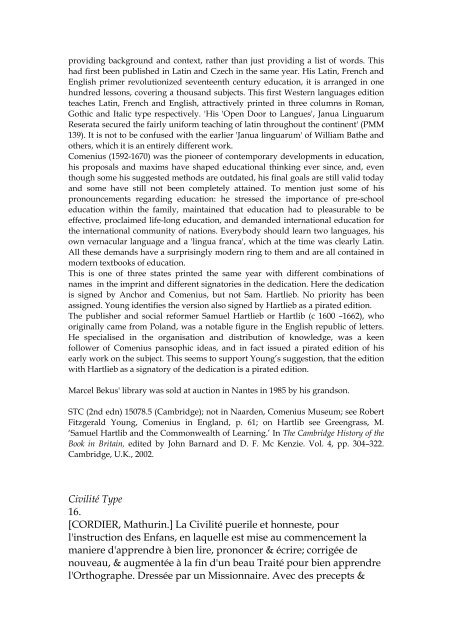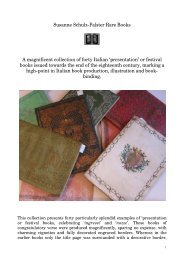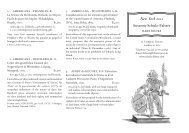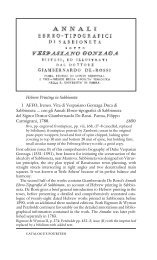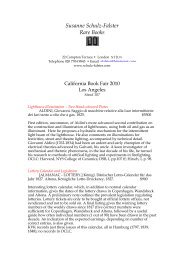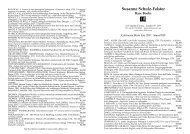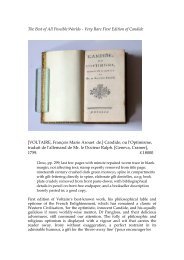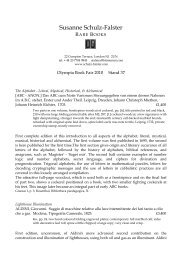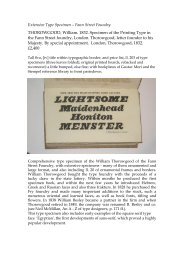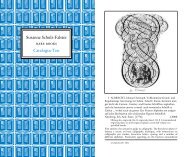«Merge Record #»«Title» - Schulz-Falster Rare Books
«Merge Record #»«Title» - Schulz-Falster Rare Books
«Merge Record #»«Title» - Schulz-Falster Rare Books
Create successful ePaper yourself
Turn your PDF publications into a flip-book with our unique Google optimized e-Paper software.
providing background and context, rather than just providing a list of words. This<br />
had first been published in Latin and Czech in the same year. His Latin, French and<br />
English primer revolutionized seventeenth century education, it is arranged in one<br />
hundred lessons, covering a thousand subjects. This first Western languages edition<br />
teaches Latin, French and English, attractively printed in three columns in Roman,<br />
Gothic and Italic type respectively. 'His 'Open Door to Langues', Janua Linguarum<br />
Reserata secured the fairly uniform teaching of latin throughout the continent' (PMM<br />
139). It is not to be confused with the earlier 'Janua linguarum' of William Bathe and<br />
others, which it is an entirely different work.<br />
Comenius (1592-1670) was the pioneer of contemporary developments in education,<br />
his proposals and maxims have shaped educational thinking ever since, and, even<br />
though some his suggested methods are outdated, his final goals are still valid today<br />
and some have still not been completely attained. To mention just some of his<br />
pronouncements regarding education: he stressed the importance of pre-school<br />
education within the family, maintained that education had to pleasurable to be<br />
effective, proclaimed life-long education, and demanded international education for<br />
the international community of nations. Everybody should learn two languages, his<br />
own vernacular language and a 'lingua franca', which at the time was clearly Latin.<br />
All these demands have a surprisingly modern ring to them and are all contained in<br />
modern textbooks of education.<br />
This is one of three states printed the same year with different combinations of<br />
names in the imprint and different signatories in the dedication. Here the dedication<br />
is signed by Anchor and Comenius, but not Sam. Hartlieb. No priority has been<br />
assigned. Young identifies the version also signed by Hartlieb as a pirated edition.<br />
The publisher and social reformer Samuel Hartlieb or Hartlib (c 1600 –1662), who<br />
originally came from Poland, was a notable figure in the English republic of letters.<br />
He specialised in the organisation and distribution of knowledge, was a keen<br />
follower of Comenius pansophic ideas, and in fact issued a pirated edition of his<br />
early work on the subject. This seems to support Young’s suggestion, that the edition<br />
with Hartlieb as a signatory of the dedication is a pirated edition.<br />
Marcel Bekus' library was sold at auction in Nantes in 1985 by his grandson.<br />
STC (2nd edn) 15078.5 (Cambridge); not in Naarden, Comenius Museum; see Robert<br />
Fitzgerald Young, Comenius in England, p. 61; on Hartlib see Greengrass, M.<br />
‘Samuel Hartlib and the Commonwealth of Learning.’ In The Cambridge History of the<br />
Book in Britain, edited by John Barnard and D. F. Mc Kenzie. Vol. 4, pp. 304–322.<br />
Cambridge, U.K., 2002.<br />
Civilité Type<br />
16.<br />
[CORDIER, Mathurin.] La Civilité puerile et honneste, pour<br />
l'instruction des Enfans, en laquelle est mise au commencement la<br />
maniere d'apprendre à bien lire, prononcer & écrire; corrigée de<br />
nouveau, & augmentée à la fin d'un beau Traité pour bien apprendre<br />
l'Orthographe. Dressée par un Missionnaire. Avec des precepts &


